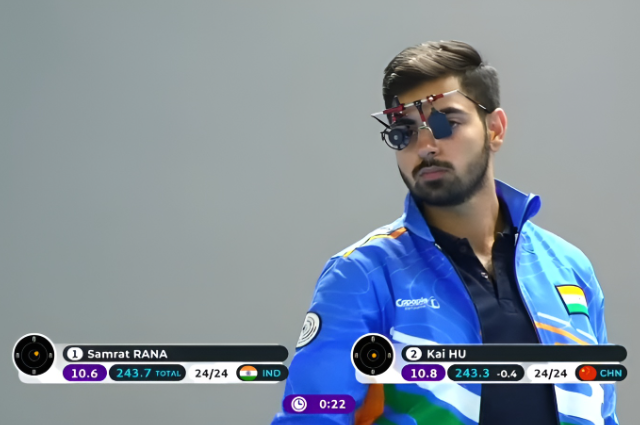In the grand theatre of international shooting sports where nerves of steel meet precision engineering, a 20-year-old from Karnal, Haryana, has written a chapter that will be remembered for generations. Samrat Rana's victory at the ISSF World Championships in Cairo on November 10, 2025, represents more than just another medal for India; it symbolises the culmination of dreams nurtured in the humblest of settings and the power of unwavering family support.
Rana's achievement is groundbreaking in its own right, as he became the first Indian to clinch an individual world title in an Olympic pistol event. With a final score of 243.7, he edged past China's formidable Hu Kai by a razor-thin margin of just 0.4 points. This wasn't merely a victory; it was a statement that India's shooting ability extends far beyond our established champions and into a new generation of fearless competitors.
The Anatomy of a Champion's Performance
What made Rana's performance particularly remarkable was the context in which it unfolded. He was competing in his first senior World Championships, facing off against Hu Kai, who had dominated the season with an undefeated streak across six World Cup gold medals. The pressure would have been overwhelming for even the most seasoned competitors, yet Rana demonstrated a maturity that belied his years.
The final was nothing short of a psychological thriller. After starting with a small 0.3-point lead, Rana found himself slipping to third place during the midpoint of the competition. Many would have crumbled under such circumstances, but this is where champions distinguish themselves from contenders. Rana responded with two perfect 10.9 shots under immense pressure, clawing his way back to the top.
The defining moment came with the final shot. Needing a minimum of 10.3 to maintain his advantage, Rana delivered a composed 10.6. His own words after the victory reveal the mindset that carried him through: "I was just focusing on my technique, not looking at the screen and trying to repeat the process." This singular focus on execution rather than outcome is the hallmark of elite performers across all disciplines.
A Double Victory for India
Rana's gold wasn't the only reason for celebration. His compatriot Varun Tomar secured the bronze medal with a score of 221.7, marking a historic double podium finish for India in this event. The duo, along with Sharvan Kumar, also helped India clinch the team gold medal with an aggregate score of 1754. This was unprecedented and never before had two Indian shooters shared the podium at a World Championships in the same event.
The qualification round itself had set the stage for this Indian dominance, with both Rana and Tomar topping with identical scores of 586 points. This collective excellence speaks volumes about the depth of talent being cultivated in Indian shooting and suggests that Rana's success is not an isolated phenomenon but part of a larger wave of emerging champions.
The Road Ahead
With his eyes firmly set on the 2028 Los Angeles Olympics, Rana harbours ambitions that extend beyond mere participation. "My dream is not only to take part; I am going to bring India a gold," he declared with the confidence of someone who has already defied the odds. Given his trajectory from junior world champion to world university gold medalist to now senior world champion, such ambition seems less like bravado and more like a reasonable projection of continued excellence.
The challenge ahead will be maintaining this form and managing expectations. The spotlight that comes with being a world champion brings its own pressures. However, if his performance in Cairo is any indication, where he toppled an athlete who had seemed invincible throughout the season, Rana possesses the mental resilience to handle whatever comes next.
A Broader Narrative
Samrat Rana's story resonates on multiple levels. On one level, it's a classic tale that the young challenger from humble beginnings who defeats the established champion. On another, it's a testament to the power of grassroots development and the importance of supportive families in nurturing talent. But perhaps most importantly, it challenges the notion that world-class achievement requires elite infrastructure and resources.
In a sporting landscape often dominated by discussions about facilities, funding, and access to international coaching, Rana's success reminds us that the fundamentals remain unchanged: dedicated practice, intelligent coaching, mental strength, and the courage to perform under pressure. His backyard range in Karnal stands as a symbol that greatness can emerge from anywhere when these elements align.
For Indian sports, Rana's victory also arrives at an opportune moment. As the nation continues to invest in developing sporting excellence across disciplines, his story provides both inspiration and a roadmap. It demonstrates that with the right support systems be it family, coaches, or institutions, India can compete at the highest levels consistently, not just occasionally.
As Samrat Rana returned from Cairo with the gold medal around his neck, he brought with him more than personal glory. He carried the dreams of every young shooter training in modest facilities across India, the hopes of parents who see potential in their children despite limited resources, and the pride of a nation increasingly confident in its sporting abilities.
Every shot Rana fires carries within it a tribute to the backyard range where his journey began, to his mother's quiet strength that built his mental strength, and to his father's unwavering belief that refused to see their limited resources as limitations. In the end, what Samrat Rana has proven in Cairo is something that transcends sports that with focus, dedication, and the right support, the boundaries of what's possible are limited only by the courage of our dreams.
The world champion from Karnal has shown us that sometimes, the most powerful training facility isn't built with state-of-the-art equipment in a high-tech complex it's constructed with wooden boxes in a backyard, bound together by love, belief, and an unshakeable commitment to excellence.
. . .
References:

